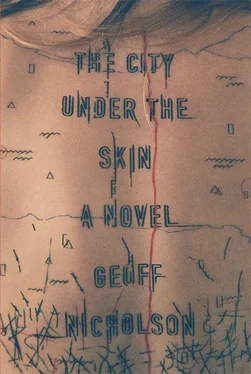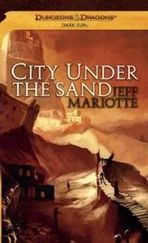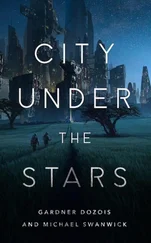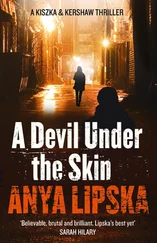“I bet I could stimulate her interest,” said Wrobleski. And then he had, or pretended to have, a new idea. “You know, there’s a little something I really do want to show you. Maybe I shouldn’t. Maybe you won’t like it. But I’m going to show it to you anyway.”
This ambivalence struck Billy as completely fake. It seemed to him that Wrobleski had made up his mind some time back that he would definitely show Billy whatever it was, that this was perhaps the sole reason for giving him the tour.
Billy said, “It’s your decision, Mr. Wrobleski.”
“Yes, it is.”
Billy knew there must be some reason, some meaning, perhaps some threat, in what Wrobleski was proposing, but what choice did he have? They came to yet another door, one that from the outside looked little different from the others, and Wrobleski duly unlocked and opened it. A wedge of light from the corridor pushed into the room and revealed a section of a deep, unlit, windowless space. Together they stepped inside, and Wrobleski closed the door behind them, so that for a few long, ominous moments they were in complete darkness; then his hand reached for a dimmer switch that slowly brought to life two overhead spotlights trained across an all but empty room. Here the walls were completely bare, there were no stacks of maps on the floor, and the spotlights were angled on a single item positioned in a far corner. It was a glass display case, not quite as tall as a man, and it contained what at first looked to Billy like a patterned shawl, or perhaps a shroud.
“What do you make of that?” Wrobleski asked.
“From here, not much,” said Billy.
“Walk over there. Go take a good look,” said Wrobleski. “Then you tell me what you think it is.”
Billy moved toward the case. At first the thing inside appeared to be a pelt, a hide, a piece of unsuccessful taxidermy, but then he realized, with a twinge of delayed recognition, because somehow he’d known all along, that it was part of a bodysuit made from an actual body: a length of flayed human skin, mounted upright on a metal armature.
It wasn’t the whole body — just the skin from the back and buttocks, so that it looked like a stretched, painted canvas. It had a worn, yellowed, well-used look, and it was tattooed, intricately, skillfully: the style looked Oriental. And the tattoos did indeed form a map of a sort, although nothing remotely like the ones Billy had seen on any of the women. These tattoos showed a stylized but highly detailed rendition of a city: houses, roads, bridges, a river, a lake, a temple, a pagoda, and at the very center, in the very middle of the back, there was a volcano.
“Now who’d build a city around the base of a volcano?” Wrobleski said, as if addressing a dim child.
Billy’s revulsion was instinctive, visceral, and although he tried telling himself there might be something fake about this skin, that it could be a horror-movie prop, a leftover from an elaborate Halloween party, he knew that was wishful thinking. The glass case also contained a photograph of the skin in situ, on its original owner, while she was still alive, a Japanese woman, small, dignified, serene, displaying her bare back and looking forlornly over her shoulder into the camera lens. The skin looked much better on her than off.
“You can see why it might resonate with me, can’t you, Billy?”
Billy gave a little groan of consent.
“Now, I’m no scholar,” said Wrobleski, “but I understand there was a time when it was common for people with tattoos to sell their skin. They made the deal while they were alive, got the money and spent it, and then when they died, the buyer went and picked up what he’d paid for. Sometimes I bet they had trouble finding the seller. Once in a while I bet they didn’t wait till he or she was dead.”
“I’ll bet.”
“Now, I know what you’re thinking, Billy. You’re thinking this would be the simple, elegant solution to all my problems. Get my women together, strip the skin off ’em — end of problem.”
“I wasn’t thinking that,” said Billy. “I don’t really know what your problem is.”
“I don’t suppose you do,” said Wrobleski. “So maybe you were thinking, What’s this fucking guy Wrobleski up to? Is he the one who did the tattoos? Why would he do that? And if he didn’t, then who did? And what does he want to do now? What does he want from me? What did he ever want? That’s pretty much what you’re thinking, isn’t it?”
“Pretty much,” Billy agreed.
“Here’s the thing, Billy. I’ve had enough of these women. In the beginning I thought it would be better to have them here rather than wandering the streets. I was wrong. Having a collection of drugged, kidnapped, tattooed women in your basement is quite a liability.”
Billy had no problem believing that.
“But you know, I’m not some sicko, I’m not going to skin ’em alive, or bathe them in acid, or throw lye all over them. I just want somebody to dispose of them for me. And that’s where you’d have come in, Billy. I thought you had potential. Killer instincts. I saw a promotion for you: better pay, better prospects. Wouldn’t be such a big step.”
“Yes, it would,” said Billy. “For me that would be a very big step indeed.”
“Oh, you might surprise yourself,” said Wrobleski.
Billy wanted to protest, to insist that Wrobleski had got him all wrong, that he wasn’t that kind of guy, that he didn’t want to be surprised. But it wasn’t an argument worth having.
“Why don’t you kill them yourself?” Billy asked.
Wrobleski’s face coalesced into a stiff frown, as if this was something he had been asking himself for a very long time.
“Professional ethics,” he said, but it was only a suggestion, a theoretical possibility, not an answer he seemed especially to believe in. “Because I don’t kill people unless I’m being paid. Is that a good enough answer?”
“Maybe,” said Billy.
“And I don’t kill women, period.”
“But you think I do?” said Billy.
“Sure. I hold you to a lower standard.”
It sounded like another of Wrobleski’s jokes.
“I wasn’t bullshitting when I said I liked the cut of your jib. You did remind me of me. An early version, an alternate version. But more than that, I saw something corruptible in you. And I wanted to corrupt it. I wanted you to be worse than me. Does that make me a bad person?”
“Yeah,” said Billy. “I think it does.”
“Anyway, it turns out I was wrong. I couldn’t corrupt you. Good for you.”
Wrobleski’s face twisted into something that had the very slightest resemblance to a smile.
“And it’s all academic anyway,” he said. “You’re in the parking business now. You’re an ex-employee of mine. It’s been nice working with you. Let me know if you change your mind about taking this new job I’m offering. Maybe you’ll think of something I can do to persuade you. Or maybe I will.”
Driving: one of the lower functions, a task that can be accomplished when the mind is a very, very long way off, absorbed in its own static of words not said and actions not completed. Billy Moore’s concentration was scattered like road salt.
He didn’t consider himself a naïve man, but he did pride himself on never thinking he was smarter than he actually was. He was wise enough to realize he had no idea where he stood with Wrobleski. Could you really walk away from a man like that? Could you turn your back and say, “Thanks for giving me the opportunity to be a cold-blooded killer, but I think I’ll pass, okay?” It seemed unlikely. He wanted to be on his own turf, with Carla. Turning down a job as a murderer might not be part of the standard definition of what it took to be a good father, but it was surely a start.
Читать дальше












